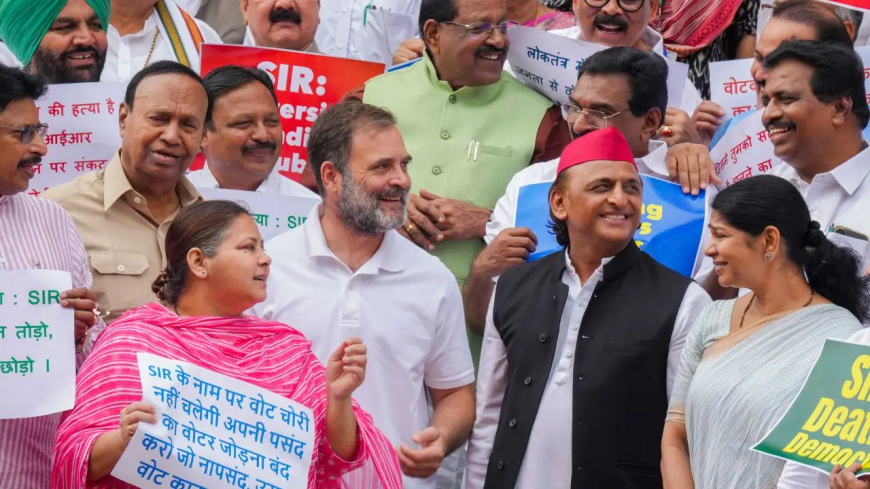‘Votebandi in the Making’: How Bihar’s SIR Sparked a Fierce Parliament Protest Over Democratic Rights
Opposition parties led by the INDIA bloc have strongly protested Bihar's Special Intensive Revision (SIR) of voter rolls, calling it an attack on democracy. Parliament witnessed major disruptions over the issue.

In a dramatic turn of events, Tuesday’s Monsoon Session of Parliament witnessed utter disruption as members of the INDIA alliance blocked proceedings in both Lok Sabha and Rajya Sabha. The trigger: the Election Commission’s Special Intensive Revision (SIR) of electoral rolls in Bihar. Opposition MPs declared the exercise a threat to democratic participation, accusing it of disenfranchising millions of voters before the crucial state assembly polls.
The Core Contention: SIR Alleged to Curtail Voting Rights
Announced on June 24 ahead of the 2025 Bihar assembly elections, the SIR requires voters to submit fresh documentation—excluding voter ID, ration card, and Aadhaar—to retain their names. Critics say this process unfairly targets migrants, daily wagers, and marginalized groups, including 52.3 lakh “missing” voters flagged by the EC. Many fear that rural and urban poor may be left out, drastically reducing voter participation. YouTube+15News Arena India+15The Wire+15The Times of India+14The Economic Times+14News Arena India+14Wikipedia+1The Times of India+1
Opposition figures have weighed in heavily. Congress MP Digvijaya Singh had previously called the SIR “technically impractical and unjust,” warning that it could remove crores of migrant votes. He described the exercise as a political ploy aimed at manipulating the electorate. The Times of India
Slogans and Sit‑Ins: INDIA Bloc Takes Action in Parliament
Alert to the gravity of the issue, INDIA bloc MPs—ranging from Rahul Gandhi and Akilesh Yadav to Priyanka Gandhi Vadra and Misa Bharti—occupied the Makar Dwar steps, carrying posters emblazoned with slogans such as:
-
“SIR: Stealing Indian Rights”
-
“Murder of Democracy”
-
“Votebandi in Mind, Votes Gone”
Their sit-in escalated tensions inside the Chambers, prompting multiple adjournments in both Houses—even before Question Hour began. Lok Sabha, for example, functioned for a mere 18 minutes across three brief sessions. The Times of India+8Hindustan Times+8The Economic Times+8The WireThe Indian Express+1Telegraph India+1
And in an extraordinary move, both Rajya Sabha and Lok Sabha were adjourned for the day, the first time in the session the agenda has been completely derailed. Navbharat Times+13Telegraph India+13Prameya News+13
Constitutional Stakes: Democracy at Risk, Say MPs
Leaders argued that SIR doesn’t just update rolls—it chips away at the right to vote. DMK MP Jebi Mather described the move as avoiding a “major segment of society.” Priyanka Gandhi dubbed it a “murder of democracy”, while RJD’s Manoj Jha warned that “if the voter is not safe, democracy is not safe.” The Economic Times+5Hindustan Times+5The Economic Times+5
Congress’s Jairam Ramesh accused the EC and government of orchestrating a "votebandi" plan under the guise of administrative rigor, declaring, “They will go to any extent to win elections.” The WireThe Wire
Official Data: Over 6% of Voters Deemed “Ineligible”
The EC recently revealed that 52.3 lakh voters—equivalent to 6.6% of Bihar's registered electorate—were flagged as ineligible due to absence, duplicates, or outdated records. This alarming figure has added urgency to the opposition’s claims of systemic disenfranchisement. Wikipedia+8The Economic Times+8The Times of India+8
Wider Political Fallout and Supreme Court Scrutiny
Burdened by fears of voter suppression, the INDIA bloc has filed numerous adjournment motions in both Houses and even raised Suspension-of-Business notices under rule 267. Their demands include full debate and immediate suspension of the SIR until voices from Bihar are duly heard. The Economic Times+9The Economic Times+9The Economic Times+9
Moreover, the matter has been taken to the Supreme Court, where judges suggested recognizing Aadhaar, voter ID, and ration card as valid proof—an EC policy reversal that signals mounting legal pressure. Wikipedia
The Government’s Response: Procedural, Not Political
The government defended the SIR as a routine and legally mandated initiative to ensure roll accuracy. Parliamentary Affairs Minister Kiren Rijiju told reporters that ministers are open to debate—so long as discussion follows proper procedure through the Business Advisory Committee. News on Air+2Prameya News+2The Wire+2
From the government’s perspective, accusations of political manipulation are an exaggerated interpretation of standard electoral housekeeping.
Impact on Parliament’s Agenda
With both Houses stalled, critical bills—including those related to criminal justice reform, defence procurement, and IIM autonomy—face likely delay. According to backbenchers, the delay compounds an early-session trend: only 27 minutes of productive work have occurred so far this week. The WireThe Economic Times
Voices from Bihar: Grievances on the Ground
The uproar in Parliament mirrors deep unease in Bihar itself. Opposition MLAs—including RJD’s Mehboob Alam—staged black-clad protests in Patna, warning of mass exclusion of workers and the migratory poor. Abdullatif Iman of AIMIM stormed the assembly well to underline the urgency. The Indian Express+1YouTube+1
Tejashwi Yadav announced plans to alert national leaders, calling for a united front to shield Bihar’s democracy from what he termed a "voter theft exercise." The Times of India+4Wikipedia+4The Times of India+4
The Stakes Ahead: Prudent Governance or Political Gain?
Opposition leaders argue that India’s democracy is at a crossroads—either updated voter rolls expand fairness, or they become mechanisms of exclusion. With Bihar state polls looming and migration-related voters at risk, this debate could redefine the political balance in the region.
Looking forward:
-
Will the EC amend guidelines to ease verification?
-
Will Bihar courts intervene?
-
Will Parliament rise above posturing to facilitate genuine debate?
Answers here could set precedents for electoral integrity across India’s next wave of elections.
Final Analysis: A Defining Moment for Democratic Norms
The SIR controversy taps into deeper currents around citizenship, migration, and electoral equity. For opposition MPs, it’s a test case—with India’s broader democratic values hanging in the balance. For government leaders, it’s a challenge to justify bureaucratic rigor.
Either way, this isn't just another parliamentary protest—it’s a defining confrontation between electoral accountability and political inclusivity. As tensions unfold, millions of Indians watch: will SIR strengthen or fracture democratic participation?



















































